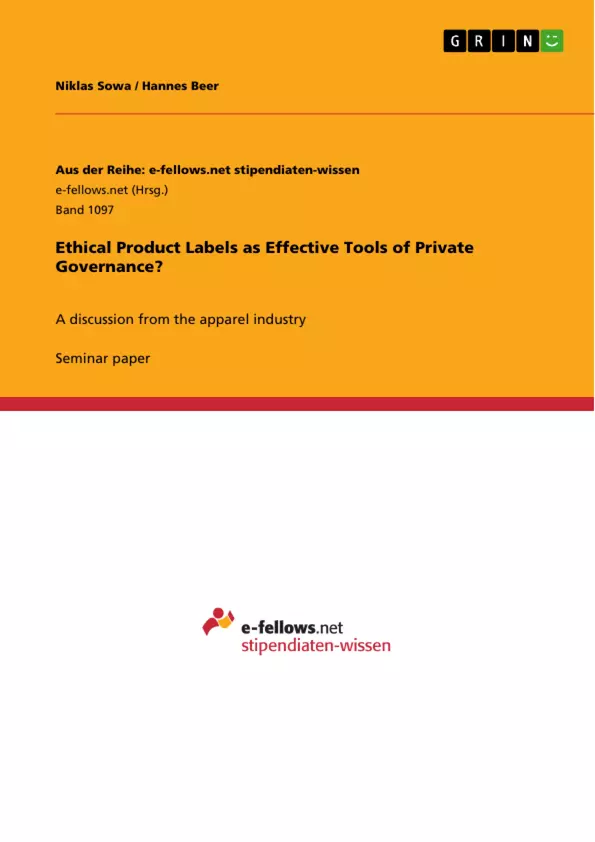In recent years one could observe a trend in global norm-setting processes towards an increased participation and influence of non-governmental organizations and private enterprises (Cutler et al., 1999; Scherer et al., 2006). This increasing international, political influence of private organizations is caused by a decreasing political influence of territorially limited governmental law and intergovernmental organizations due to more complex and mobile business environments (Zürn, 1998; Scherer et al., 2006). The collaboration of private actors is oftentimes related to the development and implementation of social and environmental standards for business processes (Scherer/Smid, 2000). The apparel and textile industry with its complex and multi-branched supply-chain is one of the industries where non-governmental actors are comprehensively involved in the development of initiatives to improve working conditions and reduce environmental pollution. In this context especially ethical labelling initiatives, which certify participating producers and their products with a product label, are of relevance. In the present seminar paper we will present three ethical labelling initiatives from the apparel sector, the Fair Wear Foundation (FWF), the Fairtrade Certified Cotton (FCC) and the Global Organic Textile Standard (GOTS) and study the effectiveness of these private governance initiatives.
Inhaltsverzeichnis (Table of Contents)
- 1. Introduction
- 2. Privatization of Global Governance
- 3. Private Governance and ethical labelling initiatives
- 3.1. The Apparel Supply Chain
- 3.2. Ethical labelling in the Apparel Industry
- 4. Discussion: How can labels function as effective tools of private governance?
- 4.1. The objective of labels
- 4.2. How to construct a good label.
- 4.3. Examination of the current label industry.
- 4.4. Recommendation and a small outlook for the “Deutsches Textilsiegel”.
- 5. Conclusion
Zielsetzung und Themenschwerpunkte (Objectives and Key Themes)
This seminar paper examines the role of ethical product labels in the apparel industry as effective tools of private governance. It explores how these initiatives contribute to improving working conditions and reducing environmental pollution within the complex supply chain of this sector.
- The shift towards private governance in global norm-setting processes
- The role of ethical labelling initiatives in the apparel industry
- The effectiveness of these initiatives as private governance tools
- Key factors in designing effective ethical product labels
- An overview of existing ethical labelling initiatives in the apparel sector
Zusammenfassung der Kapitel (Chapter Summaries)
- Chapter 1: Introduction: This chapter introduces the concept of private governance and its increasing influence in global norm-setting processes, particularly within the apparel industry. It highlights the importance of ethical labelling initiatives as a means to improve working conditions and environmental sustainability in the apparel supply chain.
- Chapter 2: Privatization of Global Governance: This chapter provides an overview of the growing trend towards private governance in global norm-setting, highlighting the decreasing political influence of territorial governments and the increased participation of non-governmental organizations and private enterprises.
- Chapter 3: Private Governance and ethical labelling initiatives: This chapter delves into the role of ethical labelling initiatives in the apparel industry. It outlines the complex structure of the apparel supply chain and discusses the key principles behind ethical labelling initiatives, focusing on their objective to improve working conditions and environmental practices.
Schlüsselwörter (Keywords)
This seminar paper focuses on private governance, ethical product labelling, the apparel industry, sustainable production, supply chain management, non-governmental organizations, corporate social responsibility, and initiatives such as the Fair Wear Foundation, Fairtrade Certified Cotton, and the Global Organic Textile Standard.
Frequently Asked Questions
What is the role of ethical product labels in global governance?
Ethical labels serve as tools of private governance, allowing non-governmental organizations and companies to set social and environmental standards where government law is limited.
Which ethical labels in the apparel industry are analyzed?
The paper examines the Fair Wear Foundation (FWF), Fairtrade Certified Cotton (FCC), and the Global Organic Textile Standard (GOTS).
Why is private governance increasing in the textile industry?
Due to complex global supply chains and mobile business environments, territorial government laws are often less effective, leading to the rise of private initiatives.
What makes an ethical label effective?
Effectiveness depends on the label's objectives, its construction (standards and monitoring), and its ability to influence producer behavior and consumer choices.
What is the outlook for the "Deutsches Textilsiegel"?
The paper provides recommendations and an outlook for the German textile seal based on the examination of existing successful private governance tools.
- Quote paper
- Niklas Sowa (Author), Hannes Beer (Author), 2014, Ethical Product Labels as Effective Tools of Private Governance?, Munich, GRIN Verlag, https://www.grin.com/document/287923



